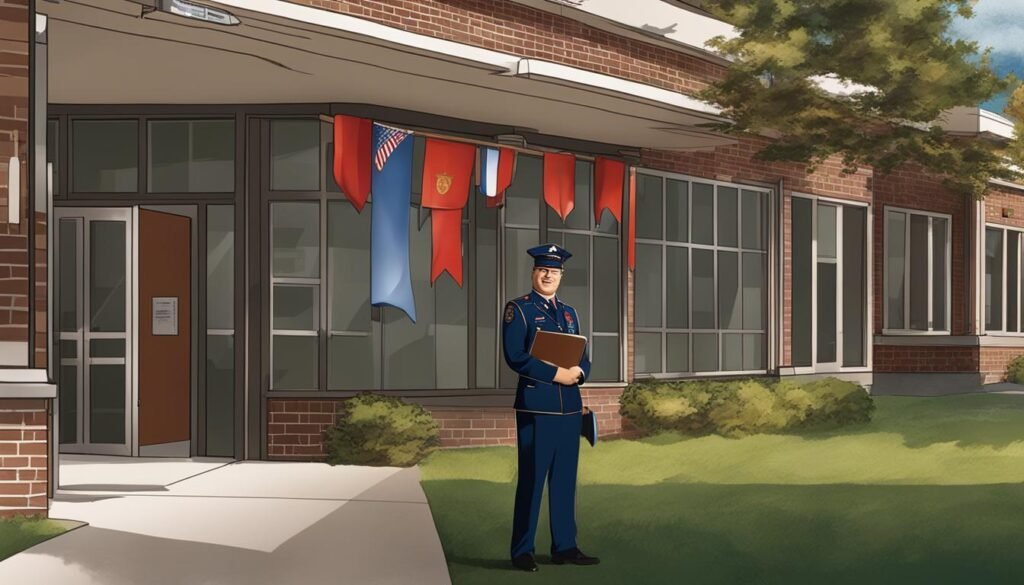Transitioning from the military to college can be a challenging process, but with the right tips, you can make a successful transition. As a military veteran, navigating the college transition may seem daunting, but remember that you already possess valuable skills and experiences that will contribute to your success. By following these tips and strategies, you can embark on a smooth journey from military to college:
Key Takeaways:
- Research and choose a college and degree program that align with your goals and interests.
- Take advantage of military-friendly colleges and the benefits they offer to veterans.
- Understand the college application process, including application deadlines and financial aid opportunities for veterans.
- Build a support system of fellow veterans, mentors, and campus resources to help you navigate the transition.
- Ensure you prioritize your physical and mental health during the transition, seeking support when needed.
Finding the Right College and Degree Program

Choosing the right college and degree program is an essential step in your successful military to college transition. Here are some tips to help you find the right fit:
1. Determine your goals and priorities
Before you begin your search, take some time to reflect on your academic and career goals. Consider what subjects or fields you are most interested in and what kind of career you envision for yourself. This will help you narrow down your options and focus on colleges that offer programs relevant to your interests.
2. Research military-friendly colleges
Look for colleges that have a strong track record of supporting military veterans and offer resources specifically tailored to their needs. These colleges often have dedicated veterans’ offices, specialized advising services, and a supportive campus culture. They may also have programs that recognize your prior military experience for college credit or provide additional benefits for veterans.
3. Consider location and campus culture
Think about your preferences for location and the overall campus culture. Some veterans may prefer colleges close to military bases for easier access to resources and support, while others may prefer a change of scenery. Research the areas surrounding potential colleges to ensure they align with your lifestyle and preferences.
4. Take advantage of college selection resources
There are numerous online resources that can help you gather information about colleges and compare different programs. Websites like College Navigator, US News and World Report, and Military Times Best for Vets offer comprehensive data and rankings that can aid in your decision-making process. Additionally, reach out to current students or alumni of the colleges you are considering to get firsthand insights into their experiences.
By taking the time to research and consider these factors, you can find a college and degree program that aligns with your goals, values, and unique circumstances as a military veteran.
| College | Location | Support Services | Benefits for Veterans |
|---|---|---|---|
| ABC University | City, State | Dedicated veterans’ office, academic advising, counseling | Prior military experience credited, tuition assistance programs |
| XYZ College | City, State | Veterans’ resource center, career services, peer mentorship | GI Bill benefits, scholarship opportunities |
| 123 Institute | City, State | Veterans’ support network, tutoring services, workshops | Transition assistance, educational grants |
Remember, finding the right college and degree program is a personal decision that should align with your goals, interests, and needs as a military veteran. Use these tips and resources to make an informed choice and set yourself up for success in your academic and career journey.

Transitioning from the military to college can be an exciting and fulfilling journey. However, the college application process can feel overwhelming, especially for veterans navigating this transition. To ensure a smooth and successful application experience, here are some valuable tips to guide you:
1. Understand Application Deadlines for Veterans
Before starting the application process, it’s crucial to familiarize yourself with the specific deadlines for veterans. Many universities offer priority application deadlines or special admission opportunities for military veterans. Take note of these dates and ensure you submit your application materials well in advance to increase your chances of acceptance.
2. Maximize Education Benefits
As a veteran, you may be eligible for various education benefits, such as the GI Bill®. Take advantage of these benefits by understanding the specific requirements and ensuring you gather all the necessary documentation. Additionally, reach out to your college’s Veterans Resource Center or equivalent department to receive guidance and support in utilizing your education benefits to their fullest extent.
3. Prepare a College Transition Checklist
Creating a checklist can help you stay organized throughout the application process. Include important tasks such as gathering transcripts, writing essays, requesting recommendation letters, and completing financial aid applications. By breaking down the process into manageable steps, you can ensure you complete all necessary requirements and submit a comprehensive application.
4. Seek Financial Aid for Veterans
Exploring financial aid options specific to veterans is crucial to alleviate the financial burden of college. Research and apply for scholarships, grants, and other forms of financial assistance available exclusively for military veterans. Additionally, complete the Free Application for Federal Student Aid (FAFSA) to determine eligibility for federal aid programs.
Remember, the college application process may differ slightly for veterans compared to traditional students. Take advantage of the resources available to you, including veterans support services at colleges and universities. With careful planning, thorough research, and timely submission of application materials, you can successfully navigate the college application process and embark on your educational journey.
What Military Skills Can Help with a Successful Transition to College?
Military skills in college can be advantageous for a successful transition. Discipline, time management, and leadership fostered in the military can assist with academic success. Additionally, the ability to adapt to new environments and work well in a team can make the college experience more fulfilling and rewarding.
Conclusion
Transitioning from the military to college can be a challenging process, but with proper planning and support, it is possible to have a successful transition. By identifying your goals, understanding your benefits, building a support system, and taking care of your physical and mental health, you can navigate the college transition with confidence.
One of the key factors in a successful military transition to college is having the right support. There are numerous resources available to military veterans transitioning to college, including veteran-specific support programs, counseling services, and peer networks. These resources can provide guidance and assistance throughout your college journey.
Additionally, it’s important to have a college transition guide to help you navigate the unique challenges you may face. This guide can include information on financial aid for veterans, application deadlines, and maximizing your education benefits. By familiarizing yourself with these resources and deadlines, you can better prepare yourself for a smooth transition.
Remember, you have already demonstrated your resilience and determination through your military service, and with the right resources and mindset, you can achieve your educational and career goals in college. Make use of the support available to you, follow the tips for veterans transitioning to college, and embark on this new chapter with confidence. Your successful military transition to college awaits.



